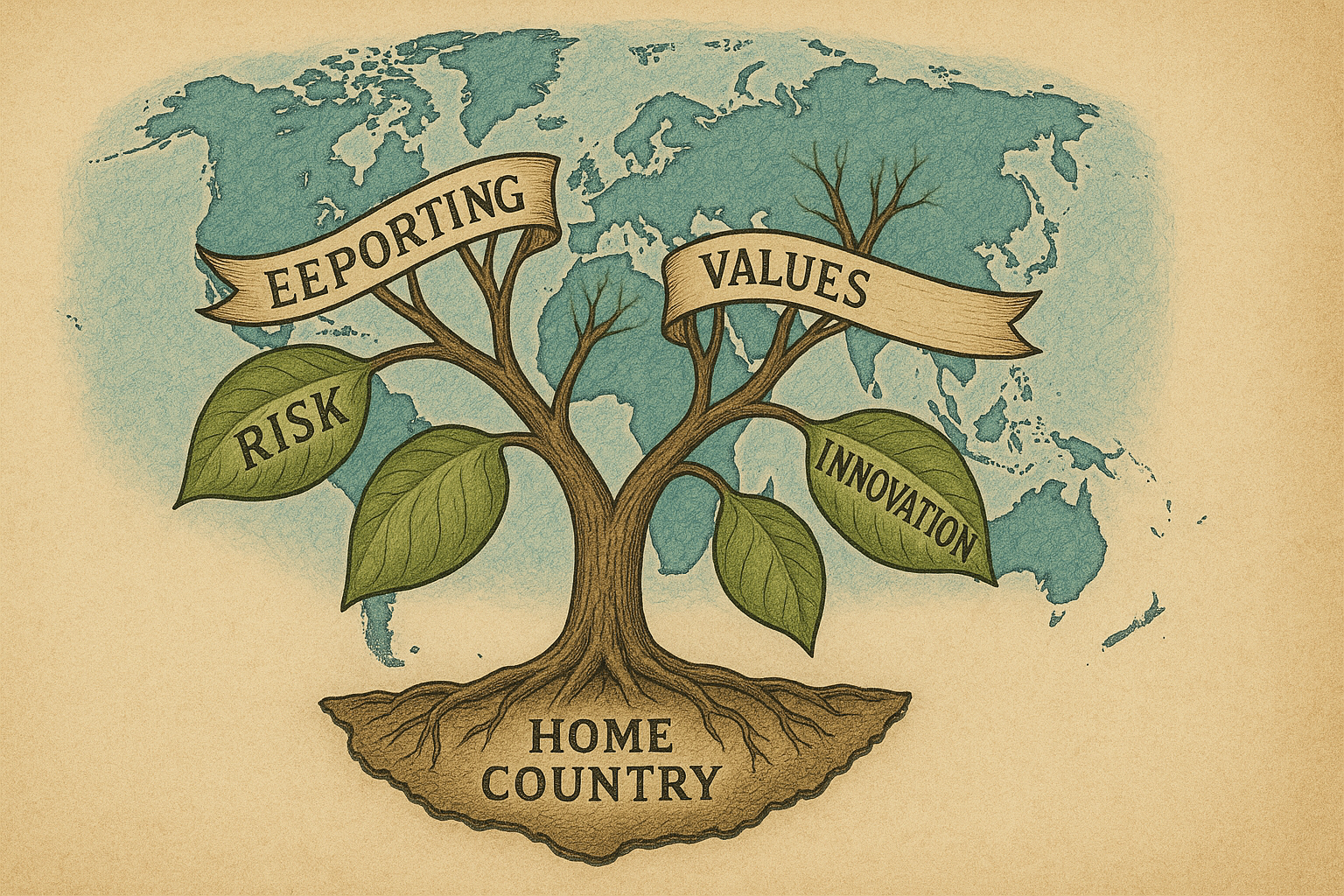Are immigrant entrepreneurs facing invisible barriers in financing their businesses?
Bryan Malki, Timur Uman, Daniel Pittino
Audio > Play / Stop
CeFEO's Authors
CeFEO counts more than 50 scholars and 30 affiliated researchers. Several studies and reports have consistently identified CeFEO as a leading research environment worldwide in the area of ownership and family business studies.
This research project, has been co-authored by the following CeFEO Members.
Reference
Spotlight highlights research-based findings only. If you’re interested in exploring this project further or delving into the theoretical and methodological details, we encourage you to contact the authors or read the full article for a comprehensive understanding.

Malki, B., Uman, T., & Pittino, D. (2022). The entrepreneurial financing of the immigrant entrepreneurs: A literature review. Small Business Economics, 58, 1337–1365.
https://doi.org/10.1007/s11187-020-00444-7

What is Spotlight?
Spotlight is an innovative online family business magazine designed to bridge the gap between cutting-edge research and the real-world needs of practitioners, owners, and policymakers. Drawing on the latest findings from the Centre for Family Entrepreneurship and Ownership (CeFEO) at Jönköping International Business School, Spotlight delivers insightful, accessible summaries of key research topics. Our mission is to keep the family business community informed and empowered by offering actionable insights, expert analyses, and forward-thinking strategies that enhance business leadership and ownership practices for long-term success.

This article is brought to you by the WIFU Foundation
Spotlight is generously supported by the WIFU Foundation, which promotes research, education, and dialogue in the field of family business. This partnership enables us to continue bridging academic insights and real-world practice for the advancement of responsible family entrepreneurship and ownership.
How do immigrant entrepreneurs navigate financial challenges while building businesses across cultures?
Starting a business is challenging for anyone, but for immigrant entrepreneurs, the stakes are often higher and the hurdles tougher. With limited access to traditional financing and unfamiliar financial systems, many turn to their social networks, personal savings, and ethnic communities to realize their entrepreneurial dreams. Drawing from a systematic literature review, this article explores the financing paths of immigrant entrepreneurs and the lessons they offer for family businesses. We'll see how overcoming financial barriers is not just about finding money—it's about resilience, community, and strategic adaptability.
Starting a business is challenging for anyone, but for immigrant entrepreneurs, the stakes are often higher and the hurdles tougher. With limited access to traditional financing and unfamiliar financial systems, many turn to their social networks, personal savings, and ethnic communities to realize their entrepreneurial dreams. Drawing from a systematic literature review, this article explores the financing paths of immigrant entrepreneurs and the lessons they offer for family businesses. We'll see how overcoming financial barriers is not just about finding money—it's about resilience, community, and strategic adaptability.
Across the globe, immigrants are reshaping the entrepreneurial landscape. From small family businesses to high-growth tech start-ups, immigrants consistently display a higher tendency toward entrepreneurship than native-born citizens. Yet behind their ventures often lies a difficult, and largely invisible, battle: securing financing.
Family businesses founded by immigrants often face complex challenges—combining financial, cultural, and emotional dynamics. Understanding the financing strategies of immigrant entrepreneurs provides critical insights for all family businesses navigating today's increasingly diverse markets. It highlights how resilience, creativity, and community ties can turn barriers into bridges for sustainable success.
What We Studied
In their systematic literature review, Bryan Malki, Timur Uman, and Daniel Pittino analyzed 37 scholarly articles focusing on immigrant entrepreneurship financing. Their approach combined meta-synthesis with a SWOT (Strengths, Weaknesses, Opportunities, Threats) analysis, identifying how immigrant entrepreneurs finance their businesses, the barriers they encounter, and the potential pathways to overcome these hurdles.
This extensive review sheds light on the dynamics between informal and formal financing sources, the critical role of ethnic networks, and the emerging concept of "mixed embeddedness"—the ability to navigate both ethnic and mainstream financial environments.
Key Insights
Immigrant Entrepreneurs Favor Informal Financing First
Most immigrant entrepreneurs start by tapping into informal sources such as family, friends, personal savings, and co-ethnic community funds. These networks offer not just financial support but also emotional encouragement in environments where formal institutions may appear intimidating or discriminatory.
Examples of informal sources:
- Personal savings
- Family loans
- Loans from friends
- Support from co-ethnic organizations or communal funds
This preference stems not from a lack of ambition but from necessity: formal financial institutions often impose barriers that immigrant entrepreneurs are less equipped to overcome.
Formal Financial Systems Present Significant Barriers
Despite the growing awareness of immigrant entrepreneurship, financial institutions often maintain rigid processes that disadvantage immigrants. Major barriers include:
- Lack of local credit history
- Language barriers
- Discrimination based on ethnicity or immigration status
- Lack of understanding of immigrant-specific business models
Even when immigrants meet objective financial criteria, perceived risk often hampers their access to loans, investment, and credit lines.
Co-Ethnic Networks Are Powerful, But Can Limit Growth
Co-ethnic networks act as a double-edged sword. Initially, they provide the resources, trust, and familiarity necessary to launch a venture. Over time, however, entrepreneurs who rely exclusively on these networks may struggle to expand beyond niche markets.
Those who succeed often "break out" of ethnic enclaves, building bridges to the broader economy while maintaining ties to their community.
Financing Challenges Differ Across Venture Stages
The need for financing evolves over time:
- Start-up stage: Heavy reliance on personal savings and informal loans.
- Survival stage: Greater need for reliable cash flow and bridging finance.
- Growth stage: Access to larger capital, often requiring engagement with formal financial institutions or investors.
Understanding this evolution is critical for family businesses that aim to transition from start-up survival to sustainable growth.
Mixed Embeddedness: A Winning Strategy
Entrepreneurs who embed themselves both within their ethnic networks and the mainstream market (a concept known as "mixed embeddedness") enjoy better financing opportunities. They can draw on the trust and resources of their communities while accessing broader markets and formal funding channels.
Successful immigrant entrepreneurs often show:
- High cultural flexibility
- Proactive learning about local financial systems
- Strategic relationship-building with mainstream actors
Takeaways
1. Diversify Financial Networks Early
Family businesses should proactively expand their network beyond ethnic or immigrant circles. This opens doors to different sources of financing and reduces overdependence on limited community resources.
2. Invest in Financial Literacy
Financial education programs tailored to immigrant entrepreneurs can dramatically enhance their ability to navigate loan applications, manage cash flows, and plan for sustainable growth.
3. Build Bridges, Not Walls
While co-ethnic networks provide vital initial support, it is crucial to leverage them as stepping stones, not permanent safety nets. Building alliances with local businesses, investors, and institutions can enhance legitimacy and financial opportunities.
4. Tackle Discrimination Head-On
Family businesses and advocacy groups can work together to demand fairer banking practices, push for transparency in loan decision-making, and create platforms that give voice to immigrant entrepreneurs.
5. Use Time as a Strategic Asset
Persistence matters. The longer immigrant entrepreneurs stay and integrate into the host country, the more financial knowledge, trust, and opportunities they accumulate. Family businesses should adopt a long-term view on financing challenges.
Impact
Supporting immigrant entrepreneurs is not merely a social imperative—it is an economic strategy. Immigrant-founded businesses contribute significantly to innovation, job creation, and community development.
For family businesses, the lessons from immigrant entrepreneurs highlight the importance of:
- Strategic flexibility
- Relationship-building across cultures
- Balancing loyalty to roots with openness to new opportunities
As global mobility increases and societies become more diverse, embracing the immigrant entrepreneurial spirit will be key to the resilience and growth of family businesses worldwide.
Recommendations
- For Family Business Owners:
Invest in training programs that prepare second-generation leaders to navigate both ethnic and mainstream markets. - For Policymakers:
Design financing programs that acknowledge the specific challenges immigrant entrepreneurs face, such as micro-loans with less stringent collateral requirements. - For Financial Institutions:
Implement bias training for loan officers and create dedicated immigrant entrepreneur banking packages. - For Researchers:
Further explore "mixed embeddedness" mechanisms and their impact on long-term business success.

CeFEO's Authors
CeFEO counts more than 50 scholars and 30 affiliated researchers. Several studies and reports have consistently identified CeFEO as a leading research environment worldwide in the area of ownership and family business studies. This research project, has been co-authored by the following CeFEO Members.
Reference
Spotlight highlights research-based findings only. If you’re interested in exploring this project further or delving into the theoretical and methodological details, we encourage you to contact the authors or read the full article for a comprehensive understanding.

Malki, B., Uman, T., & Pittino, D. (2022). The entrepreneurial financing of the immigrant entrepreneurs: A literature review. Small Business Economics, 58, 1337–1365.
https://doi.org/10.1007/s11187-020-00444-7

What is Spotlight?
Spotlight is an innovative, AI-powered, online family business magazine designed to bridge the gap between cutting-edge research and the real-world needs of practitioners, owners, and policymakers. Drawing on the latest findings from the Centre for Family Entrepreneurship and Ownership (CeFEO) at Jönköping International Business School, Spotlight delivers insightful, accessible summaries of key research topics. Our mission is to keep the family business community informed and empowered by offering actionable insights, expert analyses, and forward-thinking strategies that enhance business leadership and ownership practices for long-term success.

This article is brought to you by the WIFU Foundation
Spotlight is generously supported by the WIFU Foundation, which promotes research, education, and dialogue in the field of family business. This partnership enables us to continue bridging academic insights and real-world practice for the advancement of responsible family entrepreneurship and ownership.












